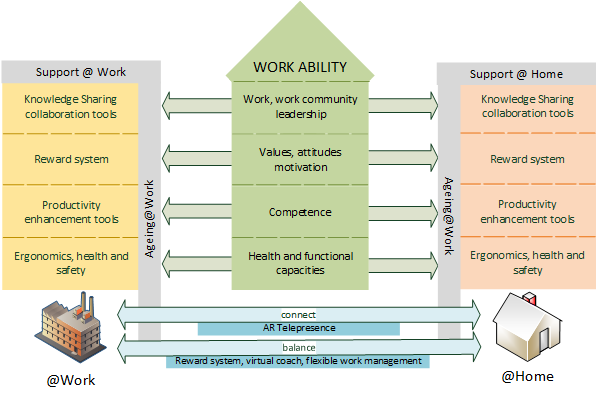Since January 1st 2019 to June 30th 2022, MultiMed Engineers participated in the Aging@Work Project — Smart, Personalized and Adaptive ICT Solutions for Active, Healthy and Productive Ageing with enhanced Workability.
Ageing brings a multitude of changes to humans. Sensorimotor and cognitive capabilities tend to degrade along with changes that appear in the aging person’s psychology and social state. Major health problems that ageing workers may face include musculoskeletal and mental disorders; depression is also currently one of the most common reasons for work disability and early retirement, while the decline of physical work capacity with age is further underlined by considering that cardiorespiratory capacity and muscular strength tend to fall by about 1–2% a year after the age of 30.
The changes associated with ageing diminish the work ability and productivity of the aging persons. According to the WHO, about 30% of men and women in the age group 50–64 years are considered to need urgent adjustments at work due to health problems related e.g. to musculoskeletal and mental disorders, to prevent the risks of early retirement and work disability.
Both the shrinkage and ageing of the workforce come at a time where the fourth Industrial revolution – also known as Industry 4.0 – is booming, resulting to an ever-increasing impact on the way that contemporary industries, factories, as well as office workplaces operate, based on continuous advances in the fields of Artificial intelligence, Big Data analytics, service and collaborative Robots, the Internet of Things etc.

With this backdrop, the Aging@Work Project envisioned the application of a holistic approach for supporting the ageing workers through the fusion of smart working and living environments, enabled through a series of highly adaptive, personalized ICT tools to help the effective establishment of key measures to counteract for crucial issues hindering the ageing workers’ workability and well-being. This allows ageing workers to remain healthy, active and productive for longer.
As shown in the Figure above, the project vision had at its core, the basic principles of the workability house endorsed by OSHA and the EC. In fact, the key to effective promotion of workability in the older workers, is to provide support to all of those layered factors, both at work and at home, while in parallel, emphasizing on tools that help the worker:
- to connect more easily to the one place while s/he is physically at the other (i.e. connect to work from home and vice-versa) and
- to maintain a balance between work and personal life, that fosters both productivity, workability and overall well-being.
Ageing@Work researched and developed a novel integrated platform of advanced, personalized and adaptive ICT tools, which on one hand, help tailoring the workplace to the evolving needs and specificities of the ageing workers, both in terms of ergonomics and in terms of work processes and task assignments, and on the other hand, support the ageing worker’s active and healthy ageing at work and at home, as well as workability, by means that include advanced, personalized physical and mental health support ICT tools, as well as telepresence and productivity enhancement tools, based on advanced AI, AR, VR and virtual assistant technologies, and with particular emphasis on flexible management of work, along with worker QoL support.
Project outcomes have been tested and evaluated in realistic conditions at two Pilot Sites, covering respectively a machining factory (in Germany) and the mining industry (in Spain).
The Project Consortium, which is coordinated by CERTH (GR), included — in addition to MultiMed Engineers — the following Partners: Universidad Politécnica de Madrid (ES), Siemens (DE), MYSPHERA (ES), Panepistimo Patron (GR), Samsung (UK), CIOP-PIB (PL), ASER (DE), Katholieke Universiteit Leuven (BE), Q-Plan (GR), ANEFA (ES), HIT (CY).
MultiMed Engineers has been in particular involved in tasks regarding the modelling of conditions in aging worker, the analysis of related risks and the study of market potential in industry sectors different from those represented by Pilot Sites.
Project Website: https://ageingatwork-project.eu/

This project has received funding from the European Union’s Horizon 2020 research and innovation programme under grant agreement No 826299
 MultiMed Engineers
MultiMed Engineers